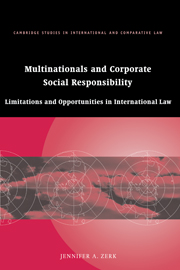 Multinationals and Corporate Social Responsibility
Multinationals and Corporate Social Responsibility Book contents
- Frontmatter
- Contents
- Preface
- Table of treaties, declarations and other international instruments
- Table of cases
- Table of statutes and statutory instruments
- List of abbreviations
- Introduction
- Part I Regulatory issues and problems
- 1 Multinationals and corporate social responsibility: a new regulatory agenda
- 2 Multinationals under international law
- 3 Multinationals under national law: the problem of jurisdiction
- Part II Home state regulation of multinationals
- Part III International regulation of multinationals
- Bibliography
- Index
- CAMBRIDGE STUDIES IN INTERNATIONAL AND COMPARATIVE LAW
2 - Multinationals under international law
Published online by Cambridge University Press: 23 July 2009
- Frontmatter
- Contents
- Preface
- Table of treaties, declarations and other international instruments
- Table of cases
- Table of statutes and statutory instruments
- List of abbreviations
- Introduction
- Part I Regulatory issues and problems
- 1 Multinationals and corporate social responsibility: a new regulatory agenda
- 2 Multinationals under international law
- 3 Multinationals under national law: the problem of jurisdiction
- Part II Home state regulation of multinationals
- Part III International regulation of multinationals
- Bibliography
- Index
- CAMBRIDGE STUDIES IN INTERNATIONAL AND COMPARATIVE LAW
Summary
What is international law? Where does it come from? To whom is it addressed? And to what extent does international law already regulate the behaviour of multinationals?
The aim of this chapter is to explore the relevance of international law to the CSR performance of multinationals, in terms of both the creation of standards and their enforcement. As will be seen, international law, as a determinedly ‘state-centred’ system, does not provide ready-made solutions to the social and environmental problems posed by multinationals. Many writers point to a ‘mismatch’ between the international legal system – built around the notion of a society of ‘sovereign equals’, each with jurisdiction over a defined patch of territory – and the reality of transnational corporate activities. How can such a system provide an adequate framework for the international regulation of CSR?
Certainly, multinationals pose real challenges to the international legal system. But these challenges are by no means insurmountable. As far as future opportunities for international regulation are concerned, two developments are potentially significant: first, the growing conviction that private entities (traditionally referred to as ‘objects’ rather than ‘subjects’ of international law) are themselves subject to ‘direct’ obligations under international human rights law and, second, growing demands on states as regulators of private enterprise.
This chapter begins with a short explanation of how international law operates, and the main sources of its legal rules. It then considers the concept of international legal personality.
- Type
- Chapter
- Information
- Multinationals and Corporate Social ResponsibilityLimitations and Opportunities in International Law, pp. 60 - 103Publisher: Cambridge University PressPrint publication year: 2006
